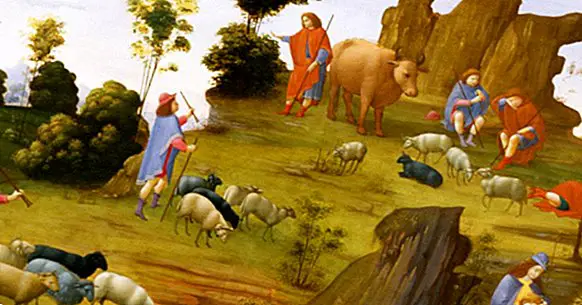Mythical thinking: what is it and how does it direct our mind?
The human being has tried since its inception find a meaning to existence , to who we are and to what happens around us.
To this end, it has employed a variety of strategies, which have ended up leading to current scientific thinking, which works from empirical evidence and the testing of hypotheses with available means.
However, before this there have been different types of explanation of reality that have been based on different elements. One of the types of thinking that have preceded scientific thinking when interpreting the different phenomena and unknowns of life is the mythical thought .
- Related article: "The 9 types of thought and their characteristics"
What is mythical thinking?
We call mythical thinking a a type of worldview or attempt to explain reality characterized by the use of a logic based on symbolism. We try to satisfy the need to give meaning to what surrounds us, based on the beliefs and values of the time and the situation in which it occurs.
In the mythical thought it is tried to give account of diverse aspects based on fantastic storytelling , in which subjective elements and references to heroic figures abound. A metaphorical use is made of such narratives, which are called myths, using them based on the association between contiguous or similar elements. The way in which the content of this thought is maintained is through tradition and the transfer of myths from generation to generation, either orally or in writing.
It is common to make references to deities and supernatural elements that they allow to personify the aspects whose cause is unknown so that what we know is used (as for example the propositive human behavior), to explain what is extraordinary to us (like the fall of a ray). In addition, it has a mainly practical purpose when looking for explanations to phenomena that have an effect on us.
It offers a direct explanation of reality so focused on the very culture that works it , without that in the mythical thought itself there is a questioning or an attempt to falsify this explanation. Also, the type of answers they offer are usually deterministic and based on the belief about the destination, so that usually gives rise to the belief that the acts themselves can not alter the course of nature.
- Related article: "Magical thinking: causes, functions and examples"
Differences between mythical thought and scientific thought
Mythical thinking is, as we have seen, the ancestor of philosophical thought and scientist . They have in common that both types of thinking try to offer the human being an explanation of why reality is how it is and the origin of the different phenomena, as well as the fact that they are based on theories that are usually based on the stability of reality .
Regarding differences, one of the main points of divergence is that while mythical thinking focuses on offering an explanation based on subjectivity and beliefs scientific thinking aims to obtain knowledge based on empirical evidence , which can be observed directly.
Likewise, scientific thinking allows the falsification and contrast of its results, allowing self-criticism and refutation of what has already been stipulated. Mythical thinking, on the other hand, tends to be dogmatic and not accept alterations nor seek visible evidence of its veracity.
Another divergent aspect is found in that we can see how scientific thinking has tried to overcome ethnocentric conceptions to focus on establishing the most universal possible explanation of events.
- Related article: "The archetypes according to Carl Gustav Jung"
Link with religion
The mythical thought is often assimilated with religious thought . The reasons for this are varied, such as the fact that in fact many religions have elaborated their own myths as explanatory elements of reality, many of them ethnocentric, that use supernatural elements in their interpretation of it and that have been transmitted through of the generations until arriving at the present time. In fact, in many cases it has been proposed that the origin of religions can be found in this type of thinking.
However, although linked and although they share some characteristics, the mythical thought does not necessarily overlap with religion.
Among other differences, we can highlight that religion it does not have to offer a deterministic conception of reality and religious faith is usually elaborated in a way that establishes a code of ethics and behavior among those who share the same beliefs. In addition, some religions do not use explanations based on personification or supernatural elements to explain natural phenomena.
Its importance
Although today it is considered that the mythical thought has been superseded by the scientist, it must be taken into account that the mythical thought has had a great influence and importance in society , both in the past and today.
Among other things, it has made it possible to progress little by little towards ways of explaining reality that are more circumscribed to the observable. It has also contributed greatly to the development of culture, allowing different perspectives on life, reality and the unknown. Religious beliefs have also been developed thanks to this kind of thinking.
Ethics has also been influenced by mythical thinking . In myths we can observe the values of our ancestors, which have been developed in different ways thanks to culture. Also, also in the art world has had and continues to have a great influence, serving many myths of artistic inspiration in all existing art forms.
- Maybe you're interested: "Sentineleses del norte: the most isolated tribe in the world"



















